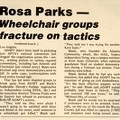[This clipping has 2 articles in it. Article 2 starts in the left top column. Article 1 continued from ADAPT 691 and the text of that article in included with ADAPT 691 for easier reading.]
ARTICLE 2
Title: Health care activism on the rise
Title: Special-interest patient `groups` are multiplying while the amount of money available is decreasing.
By Delthia Ricks, of the Sentinel staff
The dilemmas of increasing numbers of special-interest patient `groups` and a decreasing supply of health care dollars are spawning a growing militant movement in medical care.
The opening of the American Health Care Association’s annual meeting in Orlando has drawn a spotlight to the activism increasingly associated with national health care issues.
From AIDS to breast cancer to rare diseases, patients are organizing and resorting to demonstrations and protests — often violent ones — to express their views.
Members of ADAPT — American Disabled for Attendant Programs Today — have formed human barricades, chained themselves by the neck to buildings, tacked up posters against the Health and Human Services secretary, and hurled themselves from wheelchairs. The group stages many of these demonstrations at AHCA's meetings, which ADAPT routinely follows around the country.
The non-profit AHCA, headquartered in Washington, is a key lobbying organization for nursing homes and other long-term health care facilities, representing about 10,000 of them nationwide.
At issue for both `groups` is the way the federal government spends it health care money. Nursing home executives would like to see long-term health care policies reformed. ADAPT members want a share of the federal dollars going to nursing homes now.
“They're not looking at the real issue, which is long-term health care financing," Linda Keegan, an AHCA vice president said of ADAPT. “One of the biggest issues we face today is long-term health care financing reform."
Among the issues her organization will address throughout the week will be ways in which the government can devise a long-term health care policy and meet the needs of elderly and disabled Americans, she said.
But ADAPT's members see billions of dollars currently flowing into long-term health care facilities and would like to have 25 percent. This way, they say, the disabled would be kept out of special care homes and living independently.
ADAPT sees using money allocated through the state and federally administered Medicaid program for in-home health care aides. The aides would be paid to cook, drive and do chores for people who are blind, have lost the use of their limbs, or suffer other disabilities.
“The issue is the right to independent living," said Ida Unsain, director of home health care at ADAPT‘s Denver headquarters. “People with disabilities are being admitted into care homes. Some of these individuals don't belong there and could be taken care of through home health. The current structure of reimbursement is slated toward care home industries, and what ADAPT is stating is that a percentage of that budget be allocated to states for independent care for the disabled."
In 1989, the most recent year federal figures are available, the federal govemment paid $23 billion in nursing home costs through the Medicaid system. Another $23 billion was paid by a combination of family assets, Veterans Administration benefits and private insurance to meet additional nuising home costs.
In Florida, nearly $850 million is paid to nursing homes from a Medicaid budget of about $4 billion, By 2020, federal officials estimate Washington's contribution to nursing homes will be $100 billion if the nation maintains the current Medicaid payment system.
Lack of a long-term health care policy that will carry the nation into the 21st century has been as big a problem for established `groups`, such the AHCA, as it has been for patients.
President Bush repeatedly has said that a long-term health care policy is an administration goal, but a plan that meets the needs of both the elderly and disabled has yet to be approved.
ADAPT's Unsain said her group does not want to wait for the administration to produce a new long-term health care policy. Money may not be allocated for them in a new health-care pie, she said, and that's why ADAPT members are seeking money now.
“The violence is part of the outcome," Unsain said. “lt's what happens when we try to express our views. It's not what we're all about."
She attributes passage of last year's federal Disability Act mandating increased access for the disabled on public transportation systems, and in buildings, to ADAPT's militancy throughout the 1980s.
Keegan of the nursing home association said ADAPT members, who stage protests every time the AHCA meets, are not concerned about changing the way the government finances long-term care.
“I think the reason they follow us is because they are looking for attention, and the method they've chosen to got mention is confrontation and disruption.“ she said.
- Created on
- Friday 12 July 2013
- Posted on
- Friday 9 November 2018
- Tags
- activists, ADAPT - American Disabled for Attendant Programs Today, AHCA - American Health Care Association, Americans with Disabilities Act, attendant services, consumer activism, home care, Ida Unsain, independent living, Linda Keegan, long term care financing, long term care policy, long term services and supports, Medicaid, militant, national healthcare policy, nursing home lobby, President George Bush, redirect 25%, tactics
- Albums
- Visits
- 1362
- Rating score
- no rate
- Rate this photo


0 comments